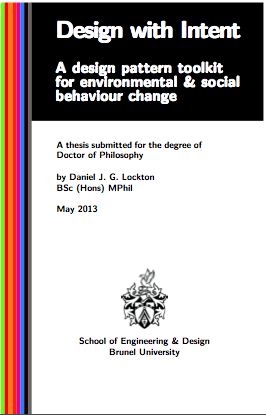Ph.D thesis: Design with Intent

Brunel University London has posted the Ph.D dissertation of Daniel Lockton, entitled “Design with Intent – A design pattern toolkit for environmental & social behaviour change” (download link).
“This thesis describes a systematic research enquiry into influencing more sustainable behaviour through design, which has produced communicable new knowledge in the form of a design pattern toolkit, called Design with Intent, developed and evaluated through an action research process. The toolkit aims to help designers create products, services and environments which influence the way people use them, primarily for environmental and social benefit; it brings together techniques for understanding and changing human behaviour from a range of psychological and technical disciplines, illustrated with examples, with the aim of enabling designers to explore and apply relevant strategies to problems.
`Design for behaviour change’ has grown significantly as a field in the past few years, to a large extent due to recognition of the contributions that user behaviour makes to the environmental and social impact of technology and designed systems in general. People’s behaviour is inevitably influenced by the design of the systems which they use, and it is not a great leap to consider that design could be used intentionally to influence behaviour where some benefit would result.
This thesis starts by identifying the need for a guide for designers working on behaviour change. It extracts insights from reviews of perspectives on influencing behaviour from different disciplines, inside and outside of `design’, which could be usefully applied in a design context. Through an action research process of iterative development and workshops with design practitioners and students, these insights are incorporated into a toolkit for designers, which is applied mainly to environmental and social behaviour change briefs. Versions of the toolkit are made publicly available, and feedback from early users in different contexts is analysed and implications for continuing development discussed.”



